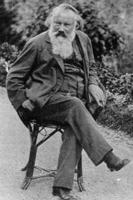Wednesday, August 31, 2005
Tuesday, August 30, 2005
Modern music without tears
 Here's a piece of modern music that you needn't fear: 4'33"!
Here's a piece of modern music that you needn't fear: 4'33"!As Peter Guttman relates, "4'33" was inspired by Cage's visit to Harvard's anechoic chamber, designed to eliminate all sound; but instead of promised silence Cage was amazed and delighted to hear the pulsing of his blood and the whistling of his nerves." In performance, the piece works as well for those innocent of its charms as it does for those who are in on it, as it were: we hear the symphony of sounds that we routinely ignore. Add the incredulity and confusion of newbies to occasional antics on the part of a performer, and you have a piece that we never tire of.
After all, as Berlioz notes, it takes 10,000 brass bands to equal the impact of a silence.
Guttman post: http://www.classicalnotes.net/columns/silence.html
Monday, August 29, 2005
Why dodecaphony?
 During their final years both Igor Stravinsky and Aaron Copland turned to dodecaphony. Even though 12-tone Stravinsky still sounds like Stravinsky, ditto Copland, why did these two masters jump the fence, so to speak?
During their final years both Igor Stravinsky and Aaron Copland turned to dodecaphony. Even though 12-tone Stravinsky still sounds like Stravinsky, ditto Copland, why did these two masters jump the fence, so to speak?Jeremy Eichler suggests a cogent possibility: "Copland's 12-tone shift can be compared with his 1920's embrace of jazz: both were styles that felt fresh to him at the time and helped him generate new compositional ideas. Copland saw the 12-tone music not as a readical departure but only as a different 'angle of vision.'"
The adopting of dodecaphony by these two 20th-century masters was a triumph, not only for the technique devised by Arnold Schoenberg (shown above), but also for its adherents. Schoenberg, it seemed, had prevailed.
The decline of dodecaphony's hegemony began not long afterwards.
Dodecaphony: see http://en.wikipedia.org/wiki/Twelve-tone_technique.
Eichler article: see http://www.nytimes.com/2005/08/24/arts/music/24bard.html
Sunday, August 28, 2005
No bad Brahms
 Every wonder why there's no bad Brahms? He and Clara went through his oeuvre, discarding all that they did not feel was first rate, a scenario that conjures up visions of the two of them sitting by the fire.
Every wonder why there's no bad Brahms? He and Clara went through his oeuvre, discarding all that they did not feel was first rate, a scenario that conjures up visions of the two of them sitting by the fire."Do you like this one?"
"Not really."
"I've never cared for it, either. Out!"
And another creation is consigned to the flames.
Considering what there is and is not for good 19th-century repertoire, I muse on what some of the vanished works sounded like, and what posterity might think of them.
Saturday, August 27, 2005
The young Brahms
 Brahms. No consideration of Western art music proceeds for very long without acknowledging our debt to this towering figure. His presence, Jovian and paternal, comes through in the iconic photos as well as in his music: we see and hear a stern Olympian. We forget however that even the great (perhaps, especially the great) were once young and hopeful.
Brahms. No consideration of Western art music proceeds for very long without acknowledging our debt to this towering figure. His presence, Jovian and paternal, comes through in the iconic photos as well as in his music: we see and hear a stern Olympian. We forget however that even the great (perhaps, especially the great) were once young and hopeful. Throughout his young life, Brahms had important advocates, none more so than Clara Wieck Schumann, the great female piano virtuoso of her age. She and her husband, composer Robert Schumann, believed powerfully in the young Brahms. After Robert's death, Clara continued as Johannes's closest friend and confidante.
Throughout his young life, Brahms had important advocates, none more so than Clara Wieck Schumann, the great female piano virtuoso of her age. She and her husband, composer Robert Schumann, believed powerfully in the young Brahms. After Robert's death, Clara continued as Johannes's closest friend and confidante. The inherently archival nature of Western art music, beginning in the mid-19th century, owes much of its identity to such continuity. Our contemporary composers internalize this canon, coming to terms with it even as they choose, perhaps, to reject it. One understands the mentality of young people who are innocent of the tradition. What, though, does one make of concert-goers whose tastes are exclusively modern? "I don't care for anything before ____." Fill in the blank...1918; Shostakovich; Stockhausen?
The inherently archival nature of Western art music, beginning in the mid-19th century, owes much of its identity to such continuity. Our contemporary composers internalize this canon, coming to terms with it even as they choose, perhaps, to reject it. One understands the mentality of young people who are innocent of the tradition. What, though, does one make of concert-goers whose tastes are exclusively modern? "I don't care for anything before ____." Fill in the blank...1918; Shostakovich; Stockhausen?Even the greats were once young and impressionable.
Photos: Johannes Brahms (1833-1897); Clara Wieck Schumann (1819-1896); the young Brahms.
Friday, August 26, 2005
Banned in Turkmenistan
 Having banned opera and ballet in 2000, Saparmurat Niyazov, President of the former Soviet Republic of Turkmenistan, has now banned lipsynching, the New York Times reported Wednesday. It gets worse. http://www.nytimes.com/2005/08/24/arts/24arts.html
Having banned opera and ballet in 2000, Saparmurat Niyazov, President of the former Soviet Republic of Turkmenistan, has now banned lipsynching, the New York Times reported Wednesday. It gets worse. http://www.nytimes.com/2005/08/24/arts/24arts.htmlPhoto by M. Pereplesnin and A. Tumanov

